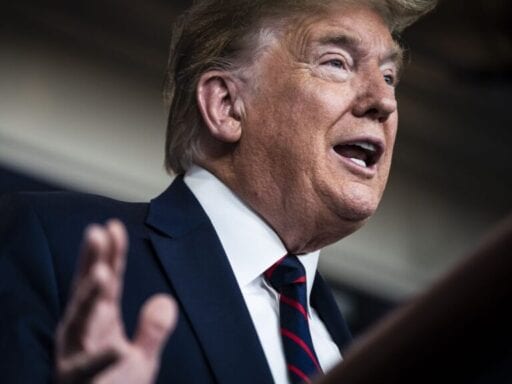Increasingly, members of the media are concerned this large audience is being given dangerous, incorrect information.
President Donald Trump boasted about the ratings of his daily live news conferences on the coronavirus Sunday, and suggested that the large viewer numbers — rather than the misleading remarks he has made during them — are fueling discussions in the media about ending the practice of broadcasting them live and unfiltered.
“Because the ‘Ratings’ of my News Conferences etc. are so high, ‘Bachelor finale, Monday Night Football type numbers’ according to the [New York Times], the Lamestream Media is going CRAZY,” Trump tweeted Sunday afternoon.
Because the “Ratings” of my News Conferences etc. are so high, “Bachelor finale, Monday Night Football type numbers” according to the @nytimes, the Lamestream Media is going CRAZY. “Trump is reaching too many people, we must stop him.” said one lunatic. See you at 5:00 P.M.!
— Donald J. Trump (@realDonaldTrump) March 29, 2020
Trump followed that tweet with four others that quoted a New York Times story that referred to the president’s daily briefings as “a ratings hit.”
But while Trump is framing the debate about whether his briefings should be broadcast live as stemming from envy or political ambition in the liberal press, in reality the arguments from columnists and staffers at CNN and MSNBC have centered on Trump showering the public with dangerous misinformation and spreading false narratives about the state of the coronavirus pandemic.
As the Times reports, Trump’s daily press briefings on coronavirus are attracting huge numbers: 8.5 million on cable news, which is, in fact, “roughly the viewership of the season finale of ‘The Bachelor.’” (Not including viewers on broadcast television or online streaming, which likely increases that figure by millions more, if not tens of millions more, people.)
Trump sees this as an opportunity to brag — a sign of his popularity and, theoretically, public trust in his leadership in a time of crisis.
The problem with that line of thinking is the fact that many people are not tuning into briefings because of Trump, but because they want to keep up-to-date on coronavirus and the US’s policies on it. During these briefings it’s not just Trump who speaks, but his coronavirus task force, which includes top public health officials like Dr. Anthony Fauci, the widely respected director of the National Institute of Allergy and Infectious Diseases, and Dr. Deborah Birx, a physician noted for her work combating HIV/AIDS and the White House’s coronavirus response coordinator.
The coronavirus pandemic has caused an economic crisis, policy chaos at home and abroad, and widespread physical and mental suffering around the globe — it would make sense that millions are tuning in to hear the nation’s top officials provide clear, accurate information on the latest.
It’s precisely the critical importance of conveying accurate information in a time of crisis that has spurred many political analysts and members of the press to argue that it’s dangerous to present Trump’s words to the public through live broadcasts. Trump has made dozens of false claims during the briefings, including overstating the potential of hydroxychloroquine as a treatment for Covid-19, and falsely saying that anyone who wants to be tested for coronavirus infections can get one.
Vox’s Matt Yglesias has argued against live broadcasts of Trump’s briefings on the basis that they’re “ersatz rallies held for political purposes rather than bona fide attempts to inform the public:”
It’s never good when politicians lie. But in a public health crisis, you have a lot of people seeking accurate information and some of those people turn toward the news media. It’s important for those of us working in the media to try to provide that information.
When a person turns on the television and sees the president of the United States giving inaccurately optimistic assessments of the progress of testing, vaccine research, and treatment it encourages people to be less careful with their hand-washing and social distancing than they otherwise might be. That costs lives.
And while offering a post-briefing “fact check” is better than nothing, it doesn’t really undo the harm of showing it in the first place. What’s called for is news coverage that incorporates the fact that the president is saying things, but that focuses on providing people with accurate information — there are not currently Covid-19 treatments that scale very well, leaving hospitals at risk of becoming overwhelmed and unable to offer ventilators to everyone who needs them, making it morally urgent to do everything possible to slow the spread of the virus until a more comprehensive testing regime can be put in place.
When prominent members of the media and news anchors like MSNBC host Rachel Maddow have argued against television networks broadcasting Trump’s briefings, it’s not been because they’re upset that someone they oppose politically is getting a lot of attention. It’s that the politician involved is exploiting that attention for political gain and hurting the public with falsehoods.
Author: Zeeshan Aleem
Read More



